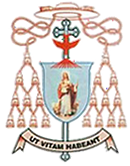CORPUS CHRISTI 2008.
THE SOLEMNITY OF THE MOST HOLY BODY AND BLOOD OF CHRIST (Year A, 2008).
AKWU – UKWU: PASTORAL VISIT TO THE SPIRITUAL YEAR SEMINARY.
The
Readings:
1st Reading:
Deut. 8:2-3, 14b-16a
God
feeds his people with manna in the wilderness – Moses recounts the providence
of God and enjoins the people to remember these things. Total dependence on God
is called for. God cares through natural process and sometimes suspends the
process of nature. He has promised to take care of his people and they can live
on the strength of that promise. The source of life for the Israelites is not
bread but the promise from God.
One great lesson here among
others is that blessing comes with responsibility.
2nd Reading:
1Cor. 10: 16-17.
In
the culture of the Middle East, eating food with another establishes a bond of companionship
that includes mutual obligations. Meal generally starts when the host breaks
bread and shares it with those at table.
Unlike
the ancient eastern rite of when you eat you incorporate the food into yourselves;
on the contrary, the Eucharist is, when
you eat, you are transformed. So when we eat the Eucharist, we are transformed
into it. The breaking of bread together form the community while the
partaking of it forms us into the Body of Christ.
Gospel: Jn. 6: 51-58.
Flesh
and blood in their parlance and context mean the human being. So, Jesus first
of all affirms the incarnation. Again, he affirms that he is the victim of
sacrifice on the cross: A real life victim with flesh and blood.
1.
His body and blood, his entire being is first sacrificed on the cross and then
offered to us as food for our salvation.
2.
Jesus’ flesh and blood is the source of life. Eternal life then begins with
eating.
3.
God is eternal life, Jesus shares the life of God and feeding on Jesus will
give us this life.
4.
Jesus, not manna, is the bread of life.
LESSONS:
1. Our
God is a God who feeds us. He fed the Israelites in the desert not because they
were worthy but because they were in need. He feeds those who are in need not
those who claim to be worthy. When Christ was preaching, he fed the hungry
crowd.
2. Today,
we are offered the real food from heaven, the pledge of eternal life, but like
always, faith is required.
3. The
Eucharist joins us to Christ and joins us to one another when we partake of it.
4. It
is a thanksgiving for our transformation and thanksgiving for our unity.
